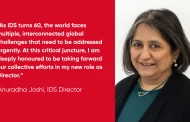By Adagbo Onoja
The September 27th – 28th Retreat of the Senate Committee on Review of the 1999 Constitution has come and gone. But it so fulfils the wisdom about a nation being an everyday plebiscite as to be provocative of yet another detailed reporting of it. In fact, it turned out far more serious than might have been imagined. At a point, Prof Julius Ihonvbere, the leader of the House of Representatives, couldn’t help noting the contrast between the elevated level of the conversation and the more dominant image of the National Assembly out there as a space of law makers busy buying luxury cars for themselves. He had a point. It is one recent public event in Nigeria which was free from mediocrity, dignitarianism and dysfunctional protocol.

Senator Barau Jibrin
Senator Barau Jibrin started it all by insisting on a constitution review process that must colonise the future. That should be the most plausible meaning of his warning on how decisions taken today could have implications for future generations and the need, therefore, for all participants to weight what they say. At that occasion, he was wearing three caps – as a Senator from Kano and, therefore, the informal host to everyone else there; as the Chairman of the Senate Committee on the review of the 1999 Constitution and as the one representing the Senate president who was outside the country.
Obviously anticipating public rebuke of the culture of unending review of the 1999 Constitution by the National Assembly, Senator Ahmed Lawan made the preemptive case for the exercise this time by arguing that as Nigerian citizens transform, so must the body of laws providing the ground norm. He would have been thought to be an unlikely hero for the gender cause but that is what he was at the opening ceremony of the retreat. He said it loud and clear: “it is time to let women rule”.
He also sent a message to governors and state governments, asking them to mind their business and follow the autonomy moment for local governments as a layer of governance.
Senator Lawan, a former and perhaps a future academic is widely regarded as a pillar of the Senate which he headed in the 9th Session a few years back.
Preliminaries over, Prof Sam Egwu, the University of Jos political scientist and INEC Resident for Benue State mounted the podium to deliver the Keynote Address. From that moment, the retreat became an Egwu moment. Everyone else seemed to love how he cut into the subject matter of the retreat, that being “Nigerian Federalism: Matters Arising for Constitutional Review”
The first surprise came in how Egwu, a noted neo-Marxist, started with a rather reflectivist take to the effect that federalism can only be a product of its history rather than something with a permanent, universally applicable meaning. Federalism is always a reflection of every nation’s context of it, making the notion of ‘true’ or ‘untrue’ federalism to be a superfluous usage, Egwu suggested.

Prof Sam Egwu in a file photo
He took aim against the simplistic ideology of return to the post-independence regional system, warning against how competing ethnicities could be so explosive in some of them. In place of moving in that direction, he offered subsidiarity as a more promising option regarding the way forward.
And he made a cogent case for residency rather than the indigeneity privileged by the 1999 Constitution as par citizenship.
But the core of his Keynote speaker’s text and which was the point he took last is his indirect indictment of the elite as a collective for taking power more seriously than politics. Prof Egwu charged the elite with being more obsessed with projecting power – dealing with perceived enemies, everyday performance of autocracy and so on rather than being concerned with politics. He distinguishes politics from power, politics being about debate, contestation, communication, negotiation and consensus as distinct from power in the coercive sense of it that is commoner in this clime. Egwu stole the hearts of the legislators or listeners.
There was a break to let Muslims go for Friday prayers after which Senator Bamidele Opeyemi took over as moderator of a panel of discussants made up of seven of them. They included Prof Auwalu Yadudu, the Harvard trained Bayero University, Kano law lecturer; Prof Yahya Abdullahi, the ex-Ahmadu Bello University radical expert in Agricultural Science and ideologue of the Balarabe Musa revolution in Kaduna State in the early 1980s; Prof Attahiru Jega who needs no introduction across Nigeria; Prof Joy Ezeilo, the lawyer cum gender activist from the University of Nigeria, Nsukka, Senator Osita Izunaso and yet another Senator, a SAN from the Southwest.
This panel sank its teeth into Prof Egwu’s presentation. Taken thematically, the key issues came to the vexatious ones such as restructuring/devolution/regionalism; state police, operationalising inclusion of women and physically challenged persons. Autonomy for the local government layer of governance is not included on this list because there was consensus on that although there was no consensus on how to disentangle governors from insisting on controlling LGCs, formally or through the backdoor.

Senator Oluranti, the iconic gender spokesperson
Even Prof Egwu and Prof Jega who have worked together as political scientists, with ties to INEC in quick succession and as friends, could not agree on how this could be done. While Jega thinks that an electoral management body at the centre would be an aberration and overburdening for INEC, Egwu thinks otherwise. It is not clear if Senator Izunaso’s idea of neither INEC nor State Independent Electoral Commission (SIEC) became a resolution of the divide. Almost no one disagreed that what goes on as elections at the local government level is worse than a mockery of democracy in whichever sense of it. Senator Ned Nwoko captured the paradox very beautifully by saying that it is only when the governors transit into the Senate that they start campaigning for local government autonomy. He favoured INEC conducting local government elections, arguing that the cost to INEC is nothing, relative to the expected outcomes.
That was as far as consensus went. All other key issue-issue areas in Egwu’s paper became issues of debate although my own notes does not see the clear North-South character of the division over restructuring/devolution/regionalism that many if not most of the newspapers have portrayed. While there was a camp for return to the old regions and those against, it was not a North-South debate as a set of senators did not see the issue that simplistic way. For them, the issue is what they call short changing for the region that has five states while the rest have six and even seven. In other words, there were campaigners who saw restructuring as increasing the number of states for the Southeast. Again, Ned Nwoko is quotable on this for the hilarity he brought to it although it was Senator Izanuso who launched the campaign. Citing the example of Anioma in relation to viability/unviability of an additional state from the Southeast, he said it has Nollywood, oil as well as gas and could function as a state. It is not clear why he cited Anioma which is not in the Southeast but perhaps to de-campaign the fear of unviability of new states, not only in the Southeast.
The major interventions on restructuring/devolution/regionalism can be synthesised into the position that, instead of returning to the regions, why not concentrate on devising responses to the challenges observable around the federal idea in Nigeria. The federal idea in Nigeria is, according to Prof Jega, for example, the problems of unity, stability and reducing mutual fears and suspicion by de-emphasising primordial identities. He proposed decentralising power which is his own understanding of restructuring anyway. It is a move implying adjusting resource allocation formula.
Surprisingly, neither Jega nor any other speakers made any reference to the rascality of power at the lower level of governance that has annulled any potentials of the local government, for example. And that’s really surprising since there is an unspoken consensus that there is little or no governance at the state level right now.

Prof Julius Ihonvbere, one of the NASS’s philosophers-king
Senator Abdul Ningi, a veteran of NASS politics who was in the eye of the storm recently warned against a return to regionalism. He too has to be quoted extensively because of the empiricism he brought to it. Empiricists can still be power when they want to. Senator Ningo disclosed how the NASS at a time had the resources to send him and a few others to as many countries as India, Singapore, US, South Korea, Indonesia, Argentina to, in his words, “see federalism at work”. His conclusion is that no two countries has the same federal system because “everything we see is human endeavour”. Obviously taking aim at the members of The Patriots but without naming them, he wondered how any such set of people could claim any sort of mandate from Bauchi Central Senatorial District over and above him, the elected representative of the over 15 ethnic nationalities he said his mandate covers.
It is not clear if Senator Ningi who studied Political Science at Ahmadu Bello University, Zaria encountered or came under the influence of the once influential theorising of the Nigerian polity in terms of “the fragility of stability and the inevitability of instability” for which the Murtala/Obasanjo regime deported the British priest political scientist, Prof James O’Connell. Whether Ningi did or not, he manifested a variant of that theory by arguing how fragile Nigeria is and the need to run away from what he regards as bubby traps. In any case, as he argued, those in power now were kids when Nigeria experimented with the regional structure, wondering why politicians can’t see a bubby trap in certain careless ideas thrown about by people who never experienced what they are talking about. “Ï see danger in shifting without adequate sensistisation. It is against the spirit of togetherness, it is against the spirit of democracy”, Ningo added.
It is not impossible that Ningi’s position is what the mainstream media seems to have reported as Northern senators being against restructuring/regionalism. Otherwise, there wasn’t such a vigorous counter to Ningi’s position that could be attributed to the South. It is safer to say that contributors were generally cautious because the point about fragility appears to be something well appreciated across the board. In other words, nobody wants a Somalia, not with so much predictions of Nigeria’s fragmentation and with many forces and interests consciously and otherwise, working for Nigeria’s break on the basis of the illusion that they will fare better in new little kingdoms.
Even the debate on state police was never a strictly North-South axis. There was simply the case of those who do not think state policing will solve any problems just as there were those who think state police is the answer to generalised insecurity. The unspoken point is always the suspected silent reasons why people take the positions they take. The notable voice for state police is Prof Joy Ezeilo and her key reason for that is that she has seen how it is the case in around 100 countries. States are already funding the Police anyway, she added, citing how states contribute huge sums of money to state police commands for sundry reasons. She doesn’t accept the point about governors hijacking state police. Federal policing doesn’t appeal to her too because sending a policeman of Sokoto origin on posting to Anambra State is, in her view, an anomaly as far as the sacrifice required of a police officer to guarantee security.

Senator Mallamadori: State Police or State of the Police?
Interestingly, Prof Jega took this same position but through a different kind of inference. Jega said state police is already a reality, what with all manner of state – government run vigilantes and which can be used for political reasons. He was, indirectly, saying that the country needs to think deeper and stop running away from formalizing what already is. That argument has a purchase for Prof Egwu in him saying that it might not be that state police is not necessary but the fear of being abused.
The contributors who dismissed state police, with some of them recommending revival of the Nigerian Police, including purchase of an armoured car for the police in each local government of the federal Republic did not speak as Northerners or Southerners. The Chairman of the Senate Committee on Police Affairs, Senator Abdulhamid Ahmed Mallam-Madori was at the retreat. He didn’t speak on the issue but a day before the Kano discussion, he tabled the motion for a bill which will institutionalise all police training schools, about 17 of them which now exist verbally. Given the way the bill was praised across the board by the Senators in the debate on the Second Reading, it appears the option of modernizing the police in the image of 21st century policing is already a consensus in the NASS. If that inference is true, it suggests that the NASS has already gone beyond petty ethno-regional politicking regarding the Police Nigeria needs.
Gendering the political process and governance was a hot issue because as Prof Joy Ezeilo put it, “a democracy that is not engendered is endangered”. Again, there was no division as the key issue was about how that is to be achieved. There was an implied attack in the statement of the speaker who asserted his disgust for advocacy and campaigning because he believes the trouble with Nigeria is lack of good enough leadership but, specifically, most speakers talked about how gendering could be operationalised when it comes to elective office. Do we isolate a senatorial district in a state and say that is for women alone? Surely, a Senator from Adamawa State couldn’t understand the fuss because he reeled off names of women senators who have been elected from the state. He mentioned Anambra State as a having had a similar experience. One of his Osun State counterparts narrated how it was men who couldn’t get elected as Senators from the state because the women were so powerful. His own solution is to encourage quality women to join politics because voters will not vote for just anybody because s/he is a man or woman.
The paradox of the debate on gendering the 1999 Constitution is how it was a male law maker who provided the explanation for why women are deserving of special concession. And that was Prof Julius Ihonvbere. Coming from the advantage of his training in political economy, he says women have to be given concession because “gender disparity is a product of the historical construction of access to the means of ownership”. How powerful the gender campaign would be if the women activists of nowadays were schooled in the political economy of gender. Unfortunately, state feminism has taken over the gender equality argument and reduced it to the obsession of First ladies and other powerful women political office holders. This is not to fail to recognise the vibrancy of Senator Adebule Oluranti and her argument for gender equity on the ground that women are, statistically, 47 percent of the over 200 million Nigerian population.

Senate President, Godswill Akpabio
The next set of senators deserving of recognition for raising the most fundamental theme are the three who insisted on the primacy of the economy as the way forward. They did not speak as a collective but they can be lumped together. For Senator Yahaya Abdullahi, what is primary is to make the economy functional. He takes that position from the analysis that Nigeria is a purely agrarian society. It is a statement implying so much, from strategies of agro-industrial transformation to how to make a semi-industrial economy functional and relatively free of foreign control. Unfortunately, these were not the type of topics the retreat centralised. Nobody mentioned Chapter Two of the Constitution to the hearing of this reporter, for example. It appears Nigerian politicians assume that the country is already a great country and that what is needed to make it a land of milk and honey is a magic frame of federalism and other structural tinkering. Of course, Nigeria is wealthy but only in potential terms. As long as it is incapable of adding industrial value to mother Earth’s generousity of solid and liquid minerals, it will remain a poor, vulnerable, agrarian African country, signifying no such strategic value to the world. Could this be what Prof Julius Ihonvbere had in mind when he talked about constitution without a culture of constitutionalism? Surely, such an expression is capable of a multiplicity of meanings. Is it possible that the next retreat is on something like “the economy and the constitution?”
Let’s give the last paragraph to Senator Abba Moro for whom the missing link is rotation of power and leadership selection. It took courage for him to remember that, without rotation as the framework for leadership selection at the state level, nobody from his Benue South Senatorial District will ever taste power in Benue State. The assumption that politicians of competing ethnic groups will be melted enough to appreciate the imperative for rotation without a constitutional provision (as has happened in Cross Rivers State, for example) has turned a mirage in Benue, Kaduna, Nasarawa and a few other states. Surprisingly, neither Prof Egwu nor any members of the panel that discussed his paper and certainly no one from the floor mentioned this point. Of course, Intervention stands to be corrected.
What became clear is that the 10th Senate has the people with the experience and exposure to remake Nigeria. The question is whether their pace satisfies the urgency required and if their priority list is also the priority list of the average voter today. The absolute adequacy of the resource persons selected and invited to provide intellectual inputs to the exercise of reviewing the 1999 Constitution and the quality of contributions by individual senators support this contention. Only time will prove or disprove this thesis!



























